

The Fading Mystique of an Objective Press. It is worth noting that non-partisan (i.e., objective) reporting coexisted easily in the same penny papers with such pungent sensationalism.
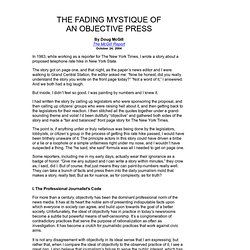
“Neutrality will sleep with anyone,” as the saying goes. An Argument Why Journalists Should Not Abandon Objectivity. In “Losing the News: The Future of the News that Feeds Democracy,” published by Oxford University Press, Alex S.
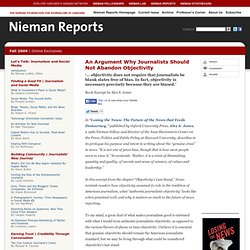
Jones, a 1982 Nieman Fellow and director of the Joan Shorenstein Center on the Press, Politics and Public Policy at Harvard University, describes in its prologue his purpose and intent in writing about the “genuine crisis” in news. “It is not one of press bias, though that is how most people seem to view it,” he contends. “Rather, it is a crisis of diminishing quantity and quality, of morale and sense of mission, of values and leadership.”
In this excerpt from the chapter “Objectivity’s Last Stand,” Jones reminds readers how objectivity assumed its role in the tradition of American journalism, what “authentic journalistic objectivity” looks like when practiced well, and why it matters so much to the future of news reporting. I define journalistic objectivity as a genuine effort to be an honest broker when it comes to news. But what, exactly, was objective journalism? James Moore: WikiLeaks and the Myth of Journalistic Objectivity. "Journalism can never be silent: that is its greatest virtue and its greatest fault.
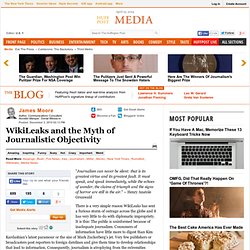
It must speak, and speak immediately, while the echoes of wonder, the claims of triumph and the signs of horror are still in the air. " ~ Henry Anatole Grunwald There is a very simple reason WikiLeaks has sent a furious storm of outrage across the globe and it has very little to do with diplomatic impropriety. It is this: The public is uninformed because of inadequate journalism.
Consumers of information have little more to digest than Kim Kardashian's latest paramour or the size of Mark Zuckerberg's jet. Very few publishers or broadcasters post reporters to foreign datelines and give them time to develop relationships that lead to information. So, long live WikiLeaks and Julian Assange. Good government, if such a thing exists, is the product of transparency.
Secrecy tends to lead to disaster and there are several object lessons to study as a result of American adventures abroad. The Importance of Objectivity in Journalism. And Now a Word from the Other Side: As a journalist trained in action rather than via textbooks, I learned very early to consider viewpoints other than my own when composing articles for publication.

I recently came across a headline accusing Democrats of "highjacking democracy" through election corruption. Well, you remember how the late ACORN lobbyists were "caught in the act" of registering hardly enough Mickey Mouses to change election results anywhere, least of all Disneyland. . . . However, I have it from a distinguished and esteemed Independent why and how Democrats steal elections beyond those ACORN employees who may have been paid per voter registered.
When you're hungry and homeless, Mickey Mouse may help out a bit. According to Jeffrey Carter (in a 10/24/10 blog titled "Chicago Election Judge Training"), a widely published expert on finance and marketing, inter alia, we Democrats steal elections by signing up illegal immigrants and sometimes allowing them to vote twice. Mr. Rethinking Objective Journalism.
July 8, 2003 | Like this article?
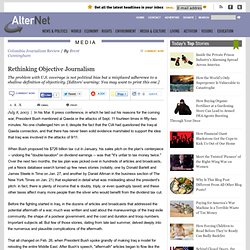
Join our email list: Stay up to date with the latest headlines via email. In his Mar. 6 press conference, in which he laid out his reasons for the coming war, President Bush mentioned al Qaeda or the attacks of Sept. 11 fourteen times in fifty-two minutes. No one challenged him on it, despite the fact that the CIA had questioned the Iraq-al Qaeda connection, and that there has never been solid evidence marshaled to support the idea that Iraq was involved in the attacks of 9/11.
When Bush proposed his $726 billion tax cut in January, his sales pitch on the plan's centerpiece -- undoing the "double-taxation" on dividend earnings -- was that "It's unfair to tax money twice. " Principles of Journalism. The first three years of the Project’s work involved listening and talking with journalists and others around the country about what defines the work.

What emerged out of those conversations are the following nine core principles of journalism: 1. Journalism’s first obligation is to the truth Democracy depends on citizens having reliable, accurate facts put in a meaningful context. Journalism does not pursue truth in an absolute or philosophical sense, but it can–and must–pursue it in a practical sense. 2. While news organizations answer to many constituencies, including advertisers and shareholders, the journalists in those organizations must maintain allegiance to citizens and the larger public interest above any other if they are to provide the news without fear or favor. 3. Journalists rely on a professional discipline for verifying information. The Myth of Objectivity in Journalism. By This page has been accessed since 29 May 1996.
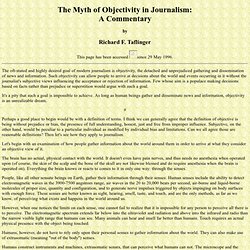
Public Journalism and the Problem of Objectivity. Objectivity in Journalism. DAVID BROOKS There is some dispute about whether objectivity can really exist.
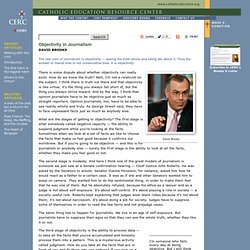
How do we know the truth? Well, I’m not a relativist on the subject. I think there is truth out there and that objectivity is like virtue; it's the thing you always fall short of, but the thing you always strive toward. And by the way, I think that opinion journalists have to be objective just as much as straight reporters. Opinion journalists, too, have to be able to see reality wholly and truly.